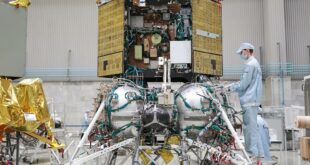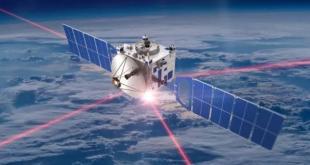
Moscow, 1 September 2020. – The Russian satellite maker Information Satellite Systems (ISS) JSC develops two dozens of lunar mission satellites, the news agency TASS reports.
ISS JSC already works on the functionality and composition of an upcoming Moon navigation system, which would include at least 24 spacecraft and which would provide people on the lunar surface with communication and positioning data, ISS CEO Nikolay Testoyedov told TASS.
According to Testoyedov, the company “has already worked thus issue through, all necessary calculations are already present.”
“We are still calculating it – the number of spacecraft, the ballistics, the number of planes, the functionality and so on. If they say they need communication, it will be provided, because [the spacecraft] will be a some sort of modification or a full clone of what we make for Earth,” Testoyedov told TASS.
The CEO disclosed that the minimum composition of a lunar navigation system must include 24 satellites, just like the Earth one. However, “the phasing of the lunar navigation group will be determined by the phasing of colonization of the Moon.”
Testoyedov pointed out that lunar satellites are likely “to be simpler, because the ones built for Earth are very multifunctional.”
Russia develops a program of research and colonization of the Moon, which will begin with automatic missions (the first, Luna-2025, is set for launch next year). Next, manned landing missions to the Moon will take place. In the future, Russia will begin construction of its visiting base at the satellite’s southern pole.
 SpaceWatch.Global An independent perspective on space
SpaceWatch.Global An independent perspective on space




